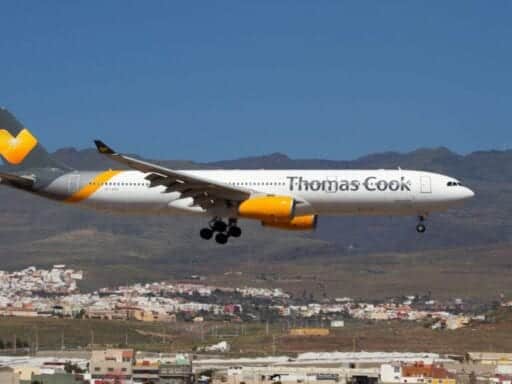Thomas Cook, the world’s oldest travel operator, suddenly declared bankruptcy Sunday evening.
The world’s oldest tour operator, Thomas Cook, suddenly ceased operations Sunday night, stranding hundreds of thousands of travelers and placing 21,000 jobs in jeopardy. The 178-year-old British company “had no choice” but to be put into immediate compulsory liquidation by its board, according to a company statement. Now, the British government and the Civil Aviation Authority is launching its largest peacetime repatriation effort — titled Operation Matterhorn — to retrieve passengers and get them home, the Telegraph reported.
Officials say that dozens of charter planes are being dispatched across the world to fly back customers, although “there are bound to be problems and delays,” Transport Secretary Grant Shapps told the Telegraph. This effort runs until October 6, and customers’ flight costs will be covered by the British government.
We are sorry to announce that Thomas Cook has ceased trading with immediate effect.
This account will not be monitored.
Please visit https://t.co/WWiKkzLYQJ for further advice and information.#ThomasCook pic.twitter.com/Nf1X3jn97x
— Thomas Cook (@ThomasCookUK) September 23, 2019
The UK’s Civil Aviation Authority requires tour operators to hold an Air Travel Organisers’ License (ATOL), which provides financial protection to customers purchasing a vacation air package or flights through a travel agent. ATOL holders are required to pay a fee of £2.50 per traveler to a fund managed by the Air Travel Trust. This government-mandated travel insurance, which has been implemented since 1973, ensures that customers will be refunded, repatriated, or reimbursed if a company like Thomas Cook collapses.
In the US, on the other hand, customers are given the choice by airlines to purchase travel insurance — typically during the ticket-purchasing process — rather than receive automatic protections (as in the case of UK travelers), even when those tickets are booked through travel agencies. According to the Wall Street Journal, every major US airline except Southwest requires travelers to confirm whether or not to “protect their trip” when buying a ticket. But language can be misleading and leave open loopholes for consumers, experts say, even when it comes to covering financial default.
“If it’s not written, it’s not covered,” Jenna Hummer, a spokesperson at travel insurance comparison site Squaremouth, told the Journal.
Last August, an investigation by the office of Sen. Edward Markey (D-MA) found that major airlines and popular travel agencies encourage customers to buy travel insurance, which offers “bare-bones plans with little coverage and a long list of exclusions that leave customers stranded.” The policies are overstated and details are often buried in fine print, the report said.
When the Icelandic budget airline Wow Air shut down its operations in March, passengers were similarly stranded around the world. Travelers who did not have travel insurance had to purchase flights home, although a number of airlines offered them discounted “rescue fares.” Still, it’s frustrating that customers are expected to fork out extra money when an airline unexpectedly closes, as the case has recently been for budget airlines.
As Aditi Shrikant reported for The Goods, budget airlines have expanded their services even when it seems financially precarious to do so: “Historically, European flights were sold through tour operators, a lot like bus tickets. But when tour operators became obsolete, airlines had to restructure. That is why Monarch and Air Berlin no longer exist.”
The UK’s last major repatriation effort came in October 2017 when Monarch Airlines shuttered, affecting 110,000 customers abroad. Thomas Cook’s demise occurred on a larger scale since the travel firm had a bigger client base and worked with subsidiary airlines in other countries. Condor, the firm’s German carrier, will receive an emergency bridge loan from the German government to keep flying, the AFP reported.
While these rescue efforts are underway, Thomas Cook’s sudden downfall suggests that the future for brick-and-mortar travel agencies isn’t bright. In 2017, nearly 700 of these UK agencies shut down, and Thomas Cook has struggled in recent years to keep up with budget airlines and online booking sites, Reuters reported.
Political uncertainty over Brexit and the government’s resistance to bailing out the company delivered one of its final blows. It’s a messy ending for the household travel brand, whose tagline — “Don’t just book it, Thomas Cook it” — has taken on new meaning in a time when flight cancellations and airline shutdowns are concerningly common.
Sign up for The Goods newsletter. Twice a week, we’ll send you the best Goods stories exploring what we buy, why we buy it, and why it matters.
Author: Terry Nguyen
Read More



